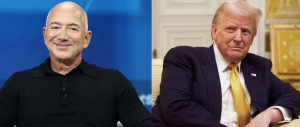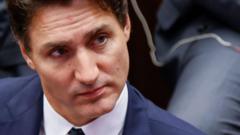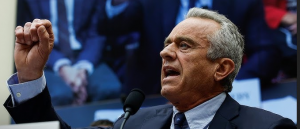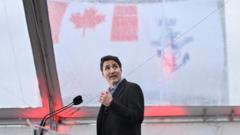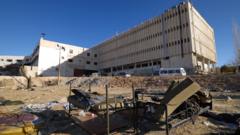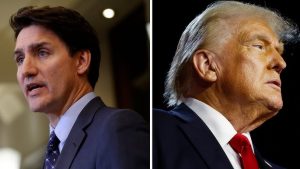Donald Trump has labeled US District Court Judge Tanya Chutkan as "the most evil person" following her decision to release over 1,800 pages of evidence pertaining to his election conspiracy case just weeks ahead of the elections.
Trump Denounces Judge as 'Evil' Over Document Release Prior to Election
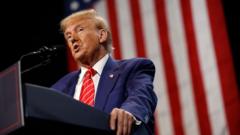
Trump Denounces Judge as 'Evil' Over Document Release Prior to Election
Trump alleges election interference after judge publishes extensive evidence in his election conspiracy case
In a dramatic escalation, Donald Trump slammed Judge Tanya Chutkan as "the most evil person" following her decision to release a vast trove of over 1,800 pages of evidence that may influence his election conspiracy case. This release, mandated just weeks before the upcoming election, has ignited the former president's allegations of "election interference."
Trump's reaction came after Judge Chutkan rejected his appeals to delay the document release until after the elections. He contended that this decision placed the judicial process in a position to affect electoral outcomes, referring to the timing as inappropriate and politically charged. Legal experts are currently dissecting the debate surrounding the Justice Department's internal rule which seeks to restrain any investigative actions that could potentially influence an election within 60 days of voting.
In defending her decision from the bench, Judge Chutkan emphasized the necessity for public access to information. She argued that withholding evidence could itself be seen as interference in the electoral process, thereby complicating the legal and ethical landscape surrounding the trial. "If the court withheld information that the public otherwise had a right to access solely because of the potential political consequences of releasing it, that withholding could itself constitute - or appear to be - election interference," she explained.
The newly released evidence mostly reiterates information that has already been public knowledge, including parts of former Vice President Mike Pence's autobiography and his earlier confirmation to not pursue the overturning of the 2020 election results. The documents followed a motion filed by Special Counsel Jack Smith last month, advancing claims against Trump regarding his alleged efforts to subvert the electoral process.
During a podcast interview with right-wing commentator Dan Bongino, Trump continued his vitriolic attack on both the judge and the special counsel, labeling him "a sick puppy." The overarching accusations against Trump center around the January 6, 2021, Capitol riot, framing him as a conspirator in an alleged strategy to unlawfully overturn his election loss to Joe Biden.
In an additional controversial statement, Trump controversially compared the ongoing detention of Capitol rioters to the internment of Japanese Americans during World War II, asserting, "Why are they still being held? Nobody's ever been treated like this. Maybe the Japanese during the Second World War, frankly.”
As legal battles loom, Trump faces multiple criminal cases, including a prior conviction on 34 felony counts related to hush-money payments. The legal implications of the new evidence and ongoing cases remain uncertain, particularly if Trump returns to the White House, a scenario he hints could lead to an end to his prosecution.
Trump's reaction came after Judge Chutkan rejected his appeals to delay the document release until after the elections. He contended that this decision placed the judicial process in a position to affect electoral outcomes, referring to the timing as inappropriate and politically charged. Legal experts are currently dissecting the debate surrounding the Justice Department's internal rule which seeks to restrain any investigative actions that could potentially influence an election within 60 days of voting.
In defending her decision from the bench, Judge Chutkan emphasized the necessity for public access to information. She argued that withholding evidence could itself be seen as interference in the electoral process, thereby complicating the legal and ethical landscape surrounding the trial. "If the court withheld information that the public otherwise had a right to access solely because of the potential political consequences of releasing it, that withholding could itself constitute - or appear to be - election interference," she explained.
The newly released evidence mostly reiterates information that has already been public knowledge, including parts of former Vice President Mike Pence's autobiography and his earlier confirmation to not pursue the overturning of the 2020 election results. The documents followed a motion filed by Special Counsel Jack Smith last month, advancing claims against Trump regarding his alleged efforts to subvert the electoral process.
During a podcast interview with right-wing commentator Dan Bongino, Trump continued his vitriolic attack on both the judge and the special counsel, labeling him "a sick puppy." The overarching accusations against Trump center around the January 6, 2021, Capitol riot, framing him as a conspirator in an alleged strategy to unlawfully overturn his election loss to Joe Biden.
In an additional controversial statement, Trump controversially compared the ongoing detention of Capitol rioters to the internment of Japanese Americans during World War II, asserting, "Why are they still being held? Nobody's ever been treated like this. Maybe the Japanese during the Second World War, frankly.”
As legal battles loom, Trump faces multiple criminal cases, including a prior conviction on 34 felony counts related to hush-money payments. The legal implications of the new evidence and ongoing cases remain uncertain, particularly if Trump returns to the White House, a scenario he hints could lead to an end to his prosecution.

